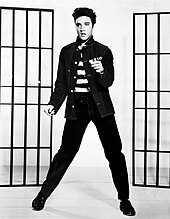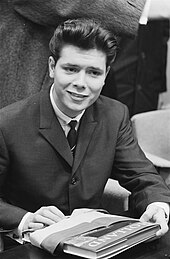List of UK singles chart number ones of the 1950s
| UK singles chart number ones |
|---|
| UK singles chart |
| Other charts |
| Related |
The UK Singles Chart is the official record chart in the United Kingdom. Record charts in the UK began life in 1952 when Percy Dickins from New Musical Express (NME) imitated an idea started in American Billboard magazine and began compiling a hit parade. Prior to this, a song's popularity was measured by the sales of sheet music.[1][2] Initially, Dickins telephoned a sample of around 20 shops asking for a list of the 10 best-selling songs. These results were then aggregated to give a Top 12 chart published in NME on 14 November 1952.[1][2] The number-one single was "Here in My Heart" by Al Martino.
According to The Official Charts Company and Guinness' British Hit Singles & Albums, the NME is considered the official British singles chart before 10 March 1960.[3] However, until 15 February 1969, when the British Market Research Bureau chart was established, there was no universally accepted chart. Other charts existed and different artists may have placed at number one in charts by Record Mirror, Disc or Melody Maker. Alternatively, some considered the BBC's Pick of the Pops, which averaged all these charts, to be a better indicator of the number-one single.[2]
In terms of number-one singles, Frankie Laine, Guy Mitchell and Elvis Presley were the most successful artists of the 1950s, having four singles reach the top spot.[nb 1] The longest duration of a single at number one was eighteen weeks, achieved by Frankie Laine's "I Believe". "I Believe" still holds the record for the most non-consecutive weeks at the top of the UK Singles Chart.[5] It is believed that the three best-selling records of the decade – Bill Haley & His Comets' "Rock Around the Clock", Paul Anka's "Diana" and Harry Belafonte's "Mary's Boy Child" – all sold over one million copies.[6][7][8]
Number-one singles
[edit]




| † | Best-selling single of the year[6] |
|---|---|
| ‡ | Best-selling single of the decade |
| [nb #] | The song spent a week at number one where it shared the top spot with another song. |
| Contents |
|---|
| Contents |
|---|
By artist
[edit]The following artists achieved three or more number-one hits during the 1950s. Artists Frankie Laine, Guy Mitchell and Elvis Presley were the most successful acts of the decade in terms of number-one singles, each having four singles reach the top of the chart.[nb 1] In total, Laine spent 32 weeks occupying the top of chart in the 1950s; the next highest was Presley who spent a total of 18 weeks at number one.
| Artist | Number ones | Weeks at number one |
|---|---|---|
| Frankie Laine | 4 | 32 |
| Elvis Presley | 4 | 18 |
| Guy Mitchell | 4 | 14 |
| Johnnie Ray | 3 | 11 |
| 3 | 10 |
By record label
[edit]The following record labels had five or more number ones on the UK Singles Chart during the 1950s.
| Record label | Number ones |
|---|---|
| Philips | 19 |
| Decca | 15 |
| Columbia | 13 |
| London | 10 |
| His Master's Voice | 7 |
| Capitol | 6 |
| RCA | 6 |
| MGM | 5 |
Notes
[edit]- ^ a b Although The Official Charts Company does not credit Paul Weston as an artist on the singles, he was also a contributing artist to four number-one singles in the 1950s.[4]
- ^ a b c d The artist, song name, date of number-one and its consecutive duration are those given by The Official Charts Company.[9]
- ^ The record labels are those given by the OCC.[10]
- ^ There are discrepancies in when a single reached number one prior to 30 August 1969. As of 2010[update] the Official Chart Company website lists all weeks as ending on the Saturday back until 20 March 1960.[11] However, the old Official Chart Company lists chart weeks prior to 5 February 1960 as ending on a Friday.[9]
- ^ a b Both Frankie Laine's and David Whitfield's version of "Answer Me" were classified jointly as number one on 11 December 1953. In the week before and the week after Laine's version took the number-one spot outright.[12]
- ^ a b Both Frankie Vaughan's "The Garden of Eden" and Guy Mitchell's "Singing the Blues" were classified jointly as number one on 1 February 1957. Vaughan held the number-one spot outright for the week before and the two weeks afterwards.[13]
- ^ a b Both Vic Damone's "On the Street Where You Live" and The Everly Brothers's "All I Have to Do Is Dream" were classified jointly as number one on 4 July 1958. For the following six weeks "All I Have to Do Is Dream" claimed the number-one spot outright.[14]
- ^ a b Both Adam Faith's "What Do You Want?" and Emile Ford and the Checkmates' "What Do You Want to Make Those Eyes at Me For?" were classified jointly as number one on 18 December 1959. For the following five weeks "What Do You Want to Make Those Eyes at Me For?" claimed the number-one spot outright.[15]
References
[edit]- Footnotes
- ^ a b Williams, Mark (19 February 2002). "Obituary: Percy Dickins". The Guardian. Retrieved 22 July 2010.
- ^ a b c Smith, Alan. "50s & 60s UK Charts – The Truth!". Dave McAleer's website. Archived from the original on 3 September 2011. Retrieved 4 November 2010.
- ^ "Key Dates in the History of the Official UK Charts". The Official Charts Company. Archived from the original on 10 January 2008. Retrieved 16 May 2010.
- ^ Warwick, Kutner & Brown 2004, pp. 1–4.
- ^ "Most Weeks at No.1 (Singles)". The Official Charts Company. Archived from the original on 29 September 2007. Retrieved 26 July 2010.
- ^ a b "The biggest song of every year revealed". Official Charts Company. 9 January 2016. Retrieved 23 March 2018.
- ^ "Stats and Facts: Million Sellers". The Official Charts Company. Archived from the original on 16 April 2008. Retrieved 19 July 2010.
- ^ "Million-Selling Singles". everyHit. Retrieved 12 June 2010.
- ^ a b "Number 1 Singles – 1950s". The Official Charts Company. Archived from the original on 5 April 2008. Retrieved 19 July 2010.
- ^ "Artist Chart History". London: Official Charts Company. 2010. Archived from the original on 3 September 2011. Retrieved 6 August 2011.
- ^ "All the Number One Singles". The Official Charts Company. Archived from the original on 17 July 2010. Retrieved 19 July 2010.
- ^ "All the No.1's: David Whitfield – Answer Me". The Official Charts Company. Archived from the original on 8 January 2008. Retrieved 22 July 2010.
- ^ Rees, Lazell & Osborne 1995, pp. 43–44.
- ^ "All the No.1's: Vic Damone – On The Street Where You Live". The Official Charts Company. Archived from the original on 8 January 2008. Retrieved 22 July 2010.
- ^ "All the No.1's: Adam Faith – What Do You Want". The Official Charts Company. Archived from the original on 8 January 2008. Retrieved 22 July 2010.
- Sources
- Rees, Dafydd; Lazell, Barry; Osborne, Roger (1995). Forty Years of "NME" Charts (2nd ed.). Pan Macmillan. ISBN 0-7522-0829-2.
- Warwick, Neil; Kutner, Jon; Brown, Tony (2004). The Complete Book Of The British Charts: Singles and Albums (3rd ed.). London: Omnibus Press. ISBN 1-84449-058-0.
